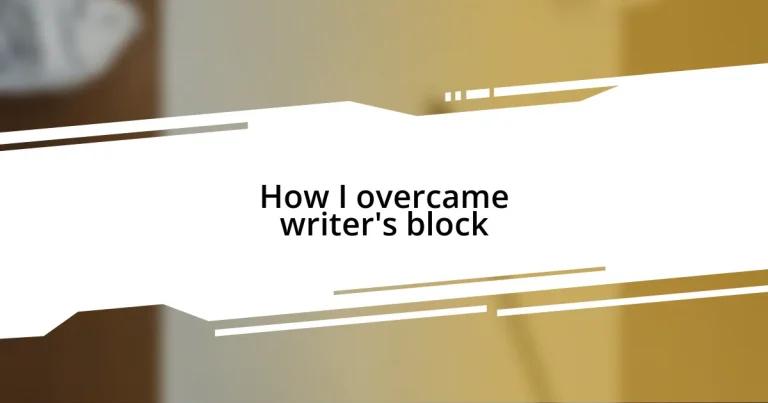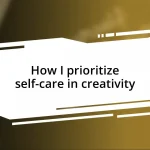Key takeaways:
- Writer’s block often stems from fear and pressure, but taking breaks and changing environments can spur creativity.
- Identifying personal triggers like deadlines, fatigue, and chaotic surroundings is crucial for overcoming writer’s block.
- Implementing small goals, timed writing sessions, and freewriting can effectively combat resistance and enhance productivity.
- Creating a supportive writing environment and connecting with fellow writers fosters motivation and inspiration.
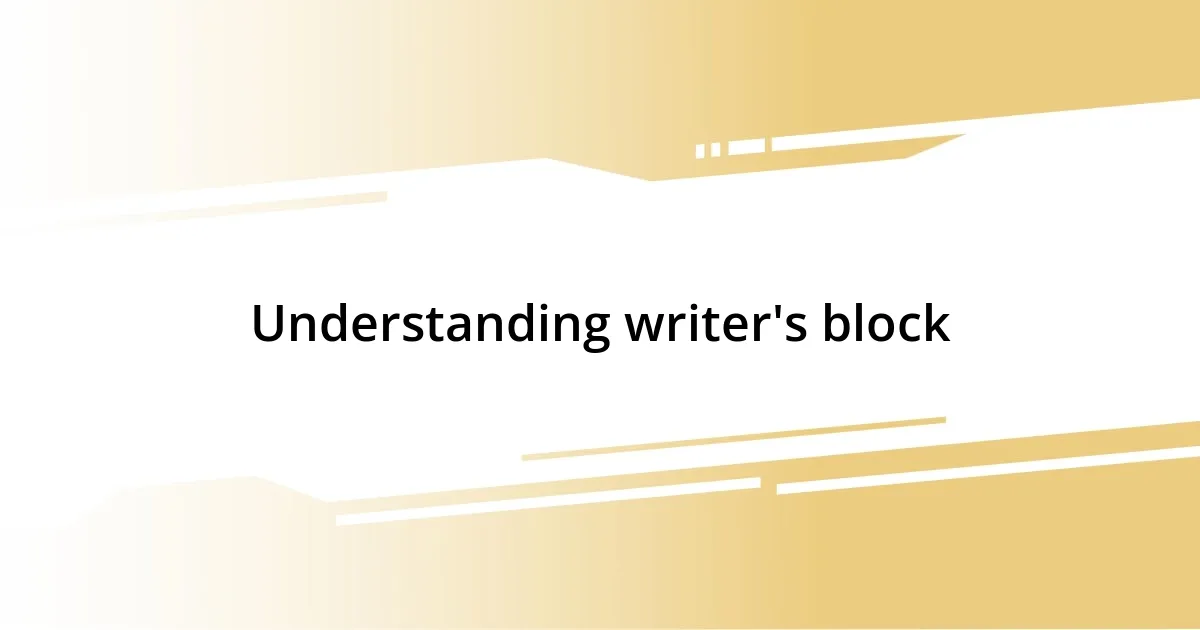
Understanding writer’s block
Writer’s block can feel like an insurmountable wall, can’t it? I’ve experienced those moments when my mind goes blank, and no matter how much I stared at the page, words just wouldn’t come. It’s a frustrating mix of pressure and self-doubt, and I often found myself questioning if I was even cut out for writing.
When I think about the nature of writer’s block, it seems to stem not just from a lack of ideas but often from fear—fear of not meeting my own expectations or the expectations of others. There’s a strange comfort in that initial blankness that can be hard to shake off; your mind races with thoughts, yet they feel too chaotic to organize into anything coherent. In those moments, I’ve had to remind myself that sometimes, it’s okay to just write poorly as a stepping stone to clarity.
I’ve learned that writer’s block can also be a signal from my body and mind, urging me to pause and reflect. I remember one particularly tough week when I took a long walk, and suddenly, snippets of dialogue rushed through my thoughts, setting the stage for a new story. It made me realize that sometimes stepping away can spark inspiration in the most unexpected ways. Have you ever noticed how a change of scenery can suddenly make ideas flow?
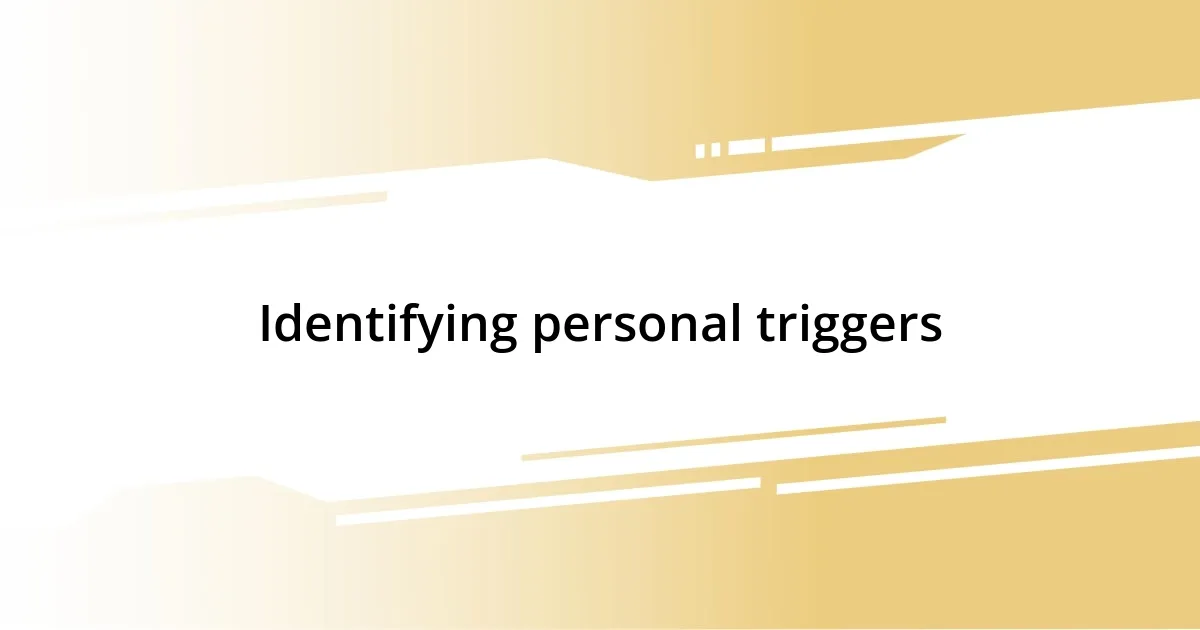
Identifying personal triggers
Identifying personal triggers often starts with self-reflection. I’ve spent hours pondering what specific situations tend to send me spiraling into that blank abyss. For me, deadlines are significant culprits—just the thought of them can tighten my chest and cloud my mind. Once, this pressure turned a simple blog post into an overwhelming mountain, making me question my ability to articulate even the simplest ideas.
Another notable trigger for me is fatigue. I vividly remember a late night when I tried to force creativity after a long day. Instead of flowing ideas, I ended up staring at the blinking cursor, feeling more drained than ever. Recognizing these patterns has been crucial. I’ve learned to respect my limits and schedule writing sessions during times when I feel energized.
I’ve also discovered that my environment plays a decisive role. A cluttered workspace can derail my focus, whereas a tidy desk allows my thoughts to flourish. I recall a moment when I rearranged my writing space, simply adding a plant and decluttering the mess. Almost instantly, my mindset shifted, and I found myself crafting words with renewed enthusiasm. Have you considered what elements in your surroundings might hinder or help your creativity?
| Trigger | Impact |
|---|---|
| Deadlines | Intense pressure leading to anxiety |
| Fatigue | Decreased energy and creativity |
| Environment | Clutter can block focus; organization enhances creativity |
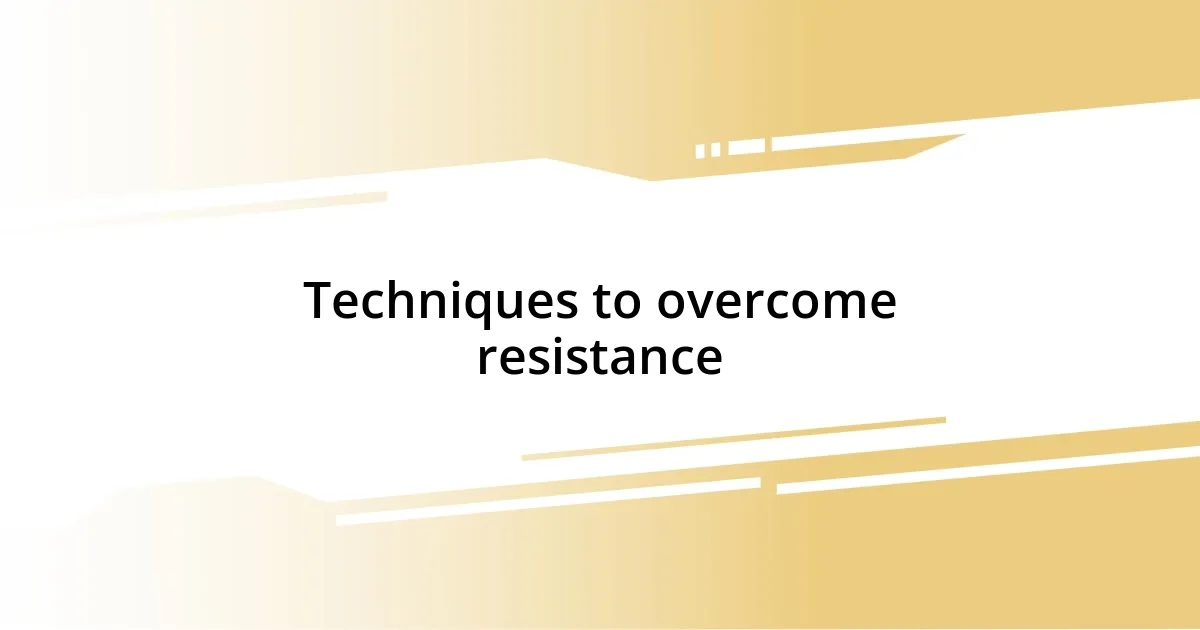
Techniques to overcome resistance
Understanding the resistance that accompanies writer’s block is crucial for moving forward. One technique I’ve found particularly effective is breaking down my goals into smaller, manageable tasks. When I faced major projects, I felt overwhelmed. I remember sitting in front of my laptop, staring at a daunting outline. It wasn’t until I decided to tackle one section at a time that I felt a sense of accomplishment. This approach transformed my anxiety into a more achievable roadmap. Sometimes, all it takes is to let go of the big picture and focus on just one small step at a time.
- Set Small Goals: Instead of aiming to complete an entire chapter, aim for just a paragraph or even a few sentences.
- Use Timed Sessions: Employ techniques like the Pomodoro Technique, where you write for 25 minutes and take a 5-minute break. This helps maintain focus without feeling drained.
- Practice Freewriting: Allow yourself to write without judgment. For instance, I once set a timer for ten minutes and let my thoughts flow without concerning myself with grammar or coherence. It was liberating!
- Change Your Medium: Sometimes switching from computer to pen and paper can unblock creativity. Reflecting on how tactile writing feels, I’ve found it often brings fresh ideas to the surface.
Another strategy that truly helped me overcome resistance was simply changing my environment. There have been days when I felt completely stuck in my usual writing spot—a familiar desk can sometimes feel like a cage. Once, I took my laptop to a nearby café, surrounded by the hum of conversation and the aroma of fresh coffee. The atmosphere ignited my creativity, and soon enough, my fingers were flying across the keyboard. Finding new spaces can reinvigorate your perspective and catalyze fresh ideas.
- Explore New Locations: Try working in a park, a library, or a cozy café. The unfamiliar surroundings can stimulate new thoughts.
- Redesign Your Space: Even small adjustments in your writing area, like adding art or adjusting the lighting, can create a fresh vibe.
- Incorporate Nature: If you can manage it, take your writing outdoors. Fresh air and natural sounds can work wonders for clarity and inspiration.
- Involve Music or Ambience: Playing instrumental music or background sounds might create a backdrop that encourages thought. For me, investing in a good set of noise-canceling headphones made a dramatic difference; suddenly, distractions faded away, and I could concentrate.
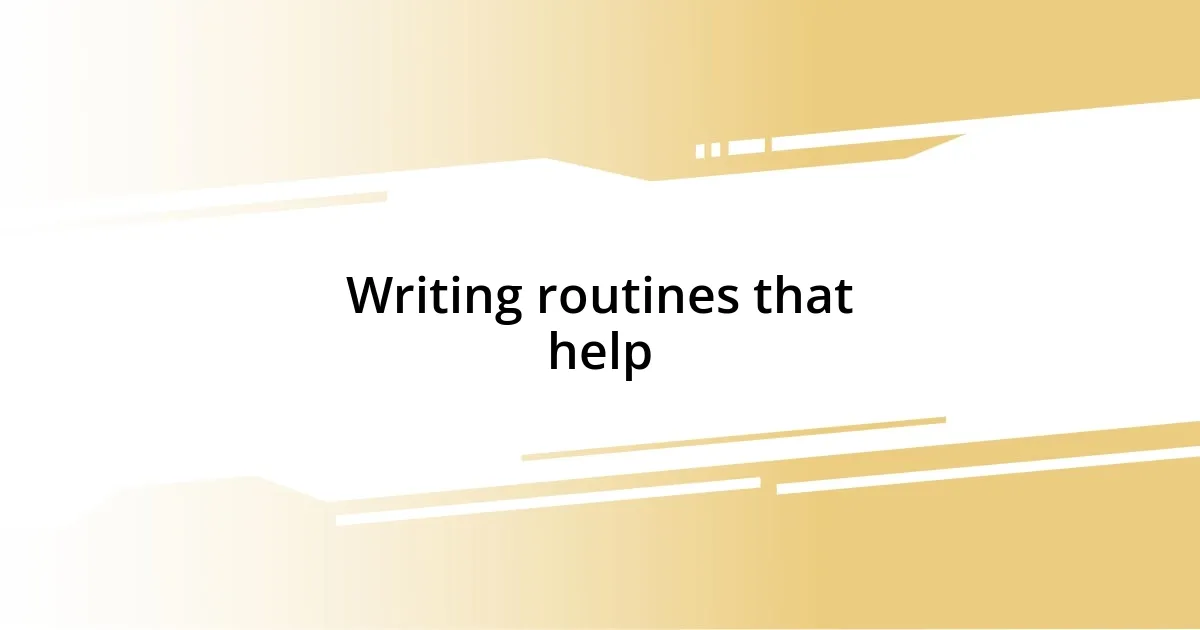
Writing routines that help
Writing routines can be the key to unlocking creativity, especially when faced with writer’s block. For example, I discovered that dedicating a consistent time each day to write helps create a rhythm in my brain. It’s like my mind starts to expect that flow of creativity at certain hours. I remember a phase where I committed to writing every morning over coffee, and it transformed my mornings from chaotic to productive. Have you found a specific time that fuels your creativity?
Incorporating rituals around my writing sessions has also proven beneficial. For instance, I always begin my writing with a short meditation or a few minutes of deep breathing. This small habit grounds me and clears my mental clutter. I once tried skipping this step in a rush, and it felt like jumping into a freezing pool. I quickly realized that taking those few moments to center myself made all the difference in my focus and engagement. Do you have a calming practice that helps you transition into your writing space?
Experimenting with different writing routines has led me to discover what works best for me. I love using a journal to jot down random thoughts or snippets that come to me throughout the day. This practice not only keeps my ideas flowing but also transforms the pressure of writing into a more spontaneous experience. One day, I scribbled a seemingly random thought and wound up creating an entire blog post from that single line. Have you considered keeping a journal for those lightbulb moments that often strike when you least expect them?
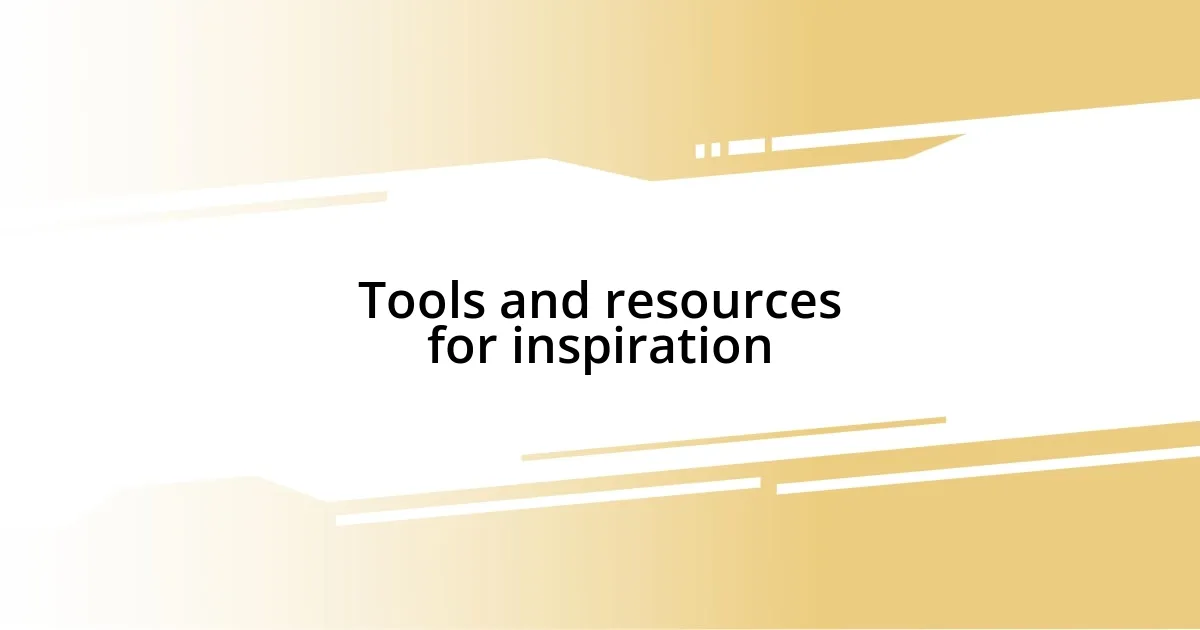
Tools and resources for inspiration
When searching for inspiration, I often turn to various tools and resources that have sparked my creativity in surprising ways. One of my favorites is using writing prompts, which can serve as an excellent starting point when I’m feeling stuck. I remember discovering a website filled with unique prompts one afternoon, and to my delight, one of them inspired a short story that I never imagined I could write! Have you tried using prompts to kickstart your imagination?
Another invaluable resource for me has been podcasts and audiobooks focused on writing. Listening to fellow authors share their experiences can be incredibly motivating. On days when I’m feeling particularly uninspired, I pop on an audiobook about a writer’s journey. It not only provides insights but often rekindles that excited spark within me. Have you considered how listening to someone else’s story can resonate with your own?
Lastly, I’ve found immense value in social media groups and forums dedicated to writing. Engaging with a community of writers, sharing struggles, and celebrating successes creates a network of encouragement. I once shared a frustrating moment in a writing group, and to my surprise, many chimed in with their experiences and advice. It felt like a warm hug amidst my creative block. Have you explored the idea of connecting with fellow writers for support and inspiration?
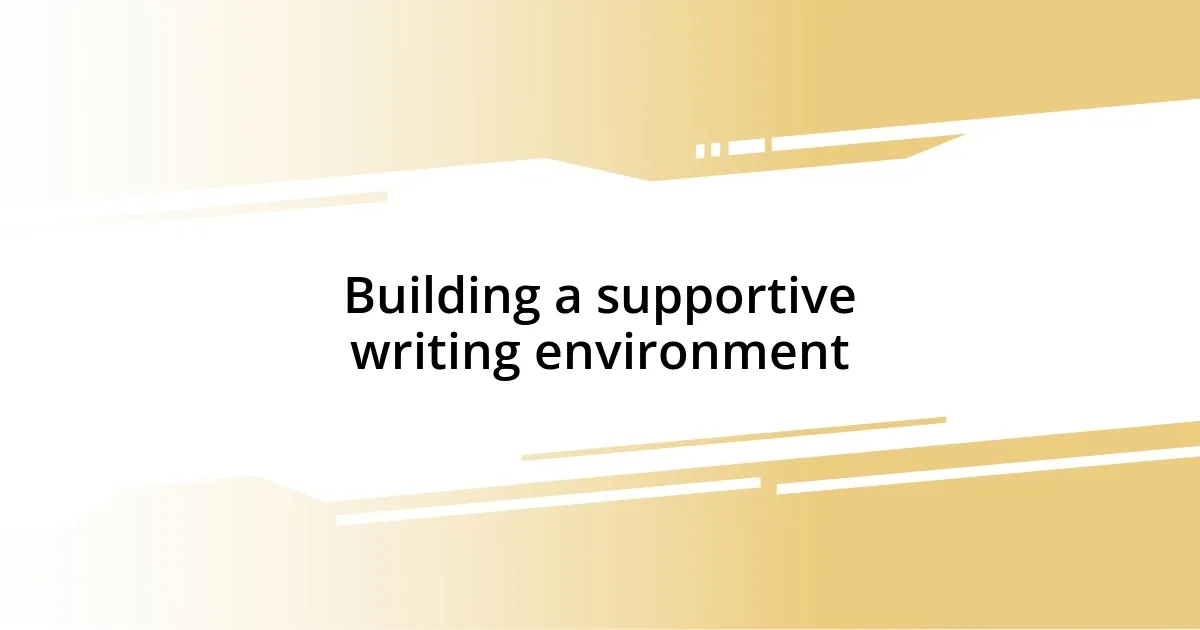
Building a supportive writing environment
Creating a supportive writing environment is essential to combat writer’s block effectively. One of my favorite steps was rearranging my workspace to make it more inviting. I filled it with inspiring quotes and images that resonate with my creative journey. On days when motivation feels distant, glancing at these reminders lifts my spirit and fuels my passion. Isn’t it interesting how a few visual cues can shift our mindset?
I also realized the importance of having a distraction-free zone. I once tried writing at a bustling café, but I ended up people-watching instead of creating. When I switched to a quiet nook in my home, everything changed. The stillness allowed my ideas to cascade freely, without interruption. Reflecting on your own writing spaces, what distractions could you eliminate to enhance your focus?
Lastly, surrounding myself with like-minded individuals has made a world of difference. I remember joining a local writing group, and it was like a breath of fresh air. Sharing my drafts, receiving constructive feedback, and hearing others’ stories transformed my approach to writing. The camaraderie we built was reassuring and spurred my creativity. Have you considered how connecting with others on a similar journey could inspire your own work?
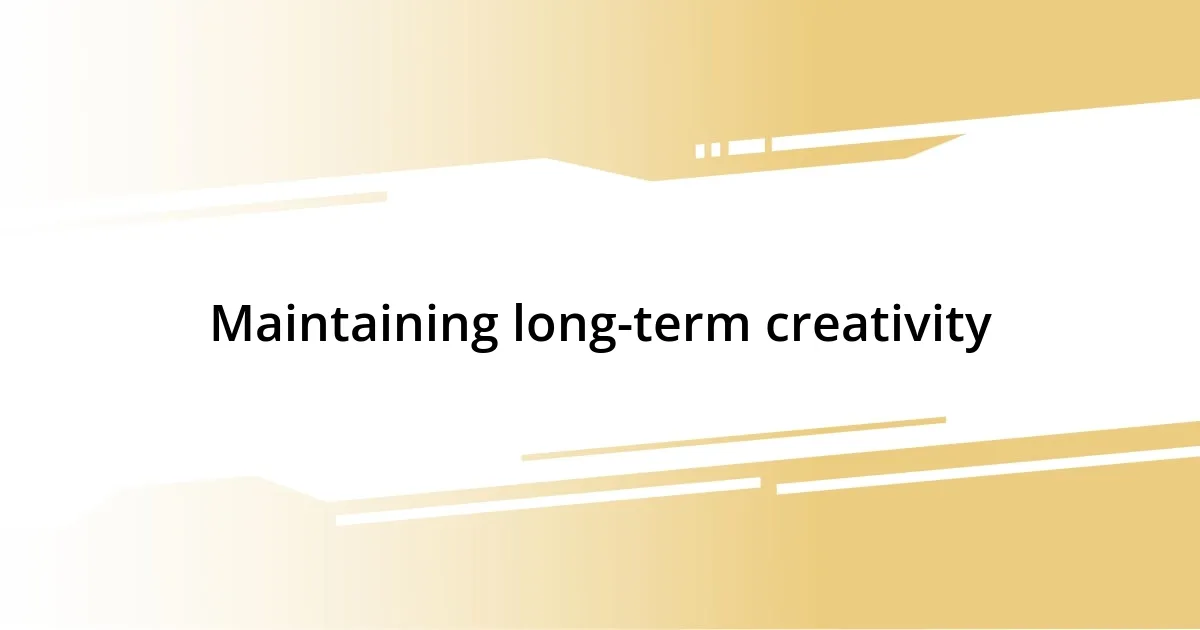
Maintaining long-term creativity
Maintaining long-term creativity isn’t just about finding inspiration; it’s also about nurturing habits that support ongoing creativity. I’ve learned that setting aside dedicated time for creative exploration can be hugely beneficial. For instance, I schedule weekly brainstorming sessions where I allow myself to think freely without judgment. During one of these sessions, I identified a story idea that’s been simmering for months. Isn’t it fascinating how commitment can unlock possibilities?
Another aspect I prioritize is diversifying my creative outlets. Recently, I picked up painting as a way to express my ideas visually. What surprised me was that the act of painting opened new pathways in my writing; I found myself describing scenes in more vivid detail. Isn’t it amazing how engaging in different creative activities can boost your skills across the board?
Lastly, I keep a creativity journal to document thoughts, dreams, and experiences. I remember flipping through my journal one evening and stumbling upon a scribbled note about a dream that had sparked an idea for a fantasy plot. Reflecting on these moments can fuel future projects and keep my creativity alive. Have you tried documenting your instincts and ideas in a way that captures your unique creative rhythm?












